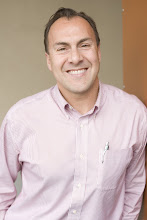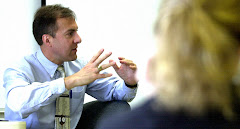Poynter Institute for Media Studies bloggers have good eyes.
They're watching what's coming over the hill, and what they're noticing is that newspaper journalism — thought to be not only over the hill but nearly dead — is showing signs of life. Cyber-life. Whoodathunkit?
Poynter points out that the LA Times, a paper I read nearly every day on my train ride into Los Angeles County, is blogging in ways that show this is a newspaper that gets it.
They get that younger readers in today's market, the ones we thought were staying away from newspapers (and news in general) are reading LA Times blogs and blogging back. In other words, journalists are talking to people. And people like it.
I like that. I'd say I'm not surprised but nobody'd believe me. I'm a historian of journalism. People like me can tell you about how journalists know how to talk to people. They have to. Used to be we called this letters to the editor. Or just phone calls. Or people walking in the newsroom, right past the secretary, and right up to the desk. Face to face with the sports editor. Or the editorial writer.
In William Allen White's daddy's day, editors would get called out in the muddy street to draw pistols over what they'd written. Interactivity, we might say.
So blogs are the latest thing, but they're not.
I'm just glad somebody noticed.
Friday, May 30, 2008
Monday, May 26, 2008
Manhattan
I just taught a course for three days in the basement of the Empire State Building.
The basement. Down a long hallway from the elevator that made Sleepless in Seattle such a throwback to an earlier movie.
I toted my computer into an airless room fitted with track lighting, acoustic engineering, and the feel of a trendy, upscale educational wing.
In that room, morning and afternoon, at the bidding of the World Journalism Institute, I invested in the minds, hearts, and souls of a roomful of students from across the country. Smart ones. Some well-versed in journalism. All of them eager to make a mark far beyond themselves. They paid attention. A few even took pictures of me in my academic gymnastics.
I exhausted myself nurturing in these unblinking eyes the passion I have — passion to make a difference, passion to write with such attention to detail and to the ironies and amazing nuances of life that audiences put down their coffee, read with full attention, and even turn a page if necessary.
Richard John Neuhaus came one day as a luncheon speaker.
Neuhaus told the students that they were wrong to think their journalism can change the world. He said journalism with that mindset is what fueled the worst oligarchies in history.
He described journalism as much less significant than that — a kind of hit-or-miss thing that has limited potential for good.
Ah, the reflections of ideological warriors who speak in cryptic vagueness. There's so much more to the story he was trying to tell. Did the students get it? I couldn't tell from their chewing, swigging of water, and overall lack of fervor for serious questions when he was done.
What Neuhaus didn't mention is how his own magazine, First Things, is part of an ongoing dialogue within the media marketplace that is, in its own way, seeking very intentionally to change the world. He's been a prolific writer for that magazine, and I'm sure holds it to high standards of journalistic excellence.
Can journalism be part of the solutions of our time? Certainly. Will it get credit for the significant pieces it places in the jigsaw puzzle? Mostly, no. But that's not what we as believers in Christ are about.
We're called to be faithful.
And Proverbs 22:29 would suggest that a journalist skilled in his work — really skilled, intensely mindful of the target — will not see that work languish in basements of buildings.
The world awaits — upstairs, on the streets, and up higher.
And journalism educators have no less daunting a task in this 21st century as audiences sit down with their coffee looking for that article that reaches into their soul.
Thick skin comes with a price.
The basement. Down a long hallway from the elevator that made Sleepless in Seattle such a throwback to an earlier movie.
I toted my computer into an airless room fitted with track lighting, acoustic engineering, and the feel of a trendy, upscale educational wing.
In that room, morning and afternoon, at the bidding of the World Journalism Institute, I invested in the minds, hearts, and souls of a roomful of students from across the country. Smart ones. Some well-versed in journalism. All of them eager to make a mark far beyond themselves. They paid attention. A few even took pictures of me in my academic gymnastics.
I exhausted myself nurturing in these unblinking eyes the passion I have — passion to make a difference, passion to write with such attention to detail and to the ironies and amazing nuances of life that audiences put down their coffee, read with full attention, and even turn a page if necessary.
Richard John Neuhaus came one day as a luncheon speaker.
Neuhaus told the students that they were wrong to think their journalism can change the world. He said journalism with that mindset is what fueled the worst oligarchies in history.
He described journalism as much less significant than that — a kind of hit-or-miss thing that has limited potential for good.
Ah, the reflections of ideological warriors who speak in cryptic vagueness. There's so much more to the story he was trying to tell. Did the students get it? I couldn't tell from their chewing, swigging of water, and overall lack of fervor for serious questions when he was done.
What Neuhaus didn't mention is how his own magazine, First Things, is part of an ongoing dialogue within the media marketplace that is, in its own way, seeking very intentionally to change the world. He's been a prolific writer for that magazine, and I'm sure holds it to high standards of journalistic excellence.
Can journalism be part of the solutions of our time? Certainly. Will it get credit for the significant pieces it places in the jigsaw puzzle? Mostly, no. But that's not what we as believers in Christ are about.
We're called to be faithful.
And Proverbs 22:29 would suggest that a journalist skilled in his work — really skilled, intensely mindful of the target — will not see that work languish in basements of buildings.
The world awaits — upstairs, on the streets, and up higher.
And journalism educators have no less daunting a task in this 21st century as audiences sit down with their coffee looking for that article that reaches into their soul.
Thick skin comes with a price.
Subscribe to:
Comments (Atom)


